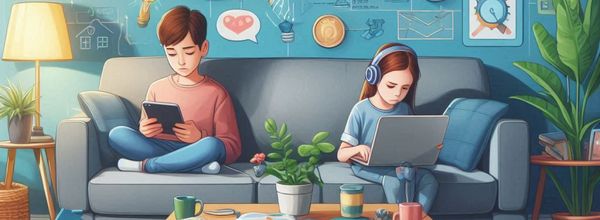How Screen Time Affects Learning and How to Manage It
Excessive screen time can negatively impact children's learning and development. Understanding these impacts and finding a balance is crucial for parents who want to support their child's education and well-being.

Screens have become an integral part of our daily lives long ago. While technology offers numerous educational benefits, excessive screen time can negatively impact children's learning and development. Understanding these impacts and finding a balance is crucial for parents who want to support their child's education and well-being.
The Impact of Screen Time on Learning
1. Distraction and Reduced Attention Span
Excessive screen time, especially involving activities like social media and gaming, can lead to shorter attention spans. Children might find it harder to focus on tasks that require prolonged concentration, such as reading or solving complex problems. The fast-paced nature of digital content can make traditional learning activities seem dull in comparison.
2. Sleep Disruption
Screens emit blue light, which can interfere with the body’s natural sleep-wake cycle. Children who spend a lot of time on screens, particularly before bedtime, often struggle with falling asleep and staying asleep. Poor sleep quality can affect cognitive functions like memory, attention, and problem-solving skills, ultimately impacting learning.
3. Physical Health Issues
Extended periods of screen time can lead to sedentary behavior, which is associated with various health issues such as obesity, poor posture, and eye strain. Physical health directly influences cognitive abilities and overall school performance.
4. Reduced Social Skills
While digital platforms can facilitate social interactions, they can also hinder the development of essential face-to-face communication skills. Children who spend more time on screens may have fewer opportunities to engage in meaningful, real-world social interactions, which are crucial for developing empathy, cooperation, and other social skills.
Managing Screen Time for Better Learning Outcomes
1. Establish Screen Time Limits
Setting clear boundaries for screen use is essential. Children aged 6 and older should have consistent limits on the time spent using media, ensuring it does not interfere with sleep, physical activity, and other healthy behaviors. Encourage screen-free times, especially during meals and before bedtime.
2. Encourage Offline Activities
Promote activities that do not involve screens, such as reading, outdoor play, arts and crafts, and family games. These activities help stimulate creativity, improve physical health, and enhance social skills.
3. Model Healthy Screen Use
Children often imitate their parents' behavior. By demonstrating balanced screen use and engaging in offline activities yourself, you can set a positive example for your children to follow.
4. Create a Balanced Schedule
Develop a daily schedule that balances screen time with other activities. Include dedicated time for homework, physical exercise, hobbies, and family interactions. Consistency and routine can help children understand the importance of various activities in their daily lives.
5. Use Educational Content
When screen time is necessary, opt for educational content that can support your child’s learning. There are many apps and programs designed to be both fun and educational, helping to make the most of screen time.
How Spy99 Can Help Manage Screen Time
Managing screen time effectively can be challenging, but tools like Spy99 can assist parents in maintaining a healthy balance. Spy 99 is a comprehensive parental control app that allows you to monitor and manage your child's screen time, ensuring it aligns with your family’s guidelines.
Key Features of Spy99:
- Real-Time Monitoring: Keep track of your child’s online activities to ensure they are engaging in productive and educational content.
- Activity Reports: Get detailed reports on how much time your child spends on different apps and websites, helping you make informed decisions about their screen use.
- Location Tracking: Ensure your child’s safety both online and offline with real-time location updates.
By integrating tools like Spy99, parents can ensure that their children’s screen time is beneficial and does not interfere with their learning and development.
While screens are a valuable resource for learning, it's important to manage their use to prevent negative impacts on children's education and well-being. By setting boundaries, promoting offline activities, and using tools like Spy 99, parents can create a balanced environment that supports their child's growth and learning.



